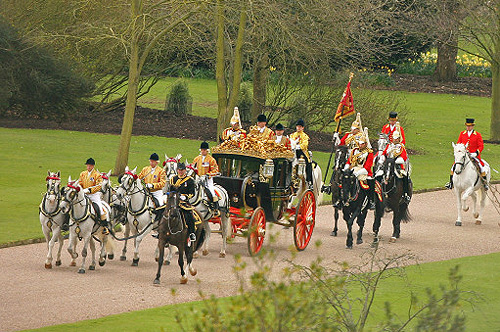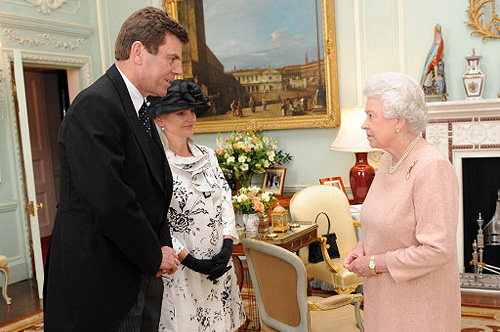The Post of High Commissioner
The office of high commissioner is much more than a curious imperial relic. It is a diplomatic asset. Unlike ambassadors, high commissioners in London enjoy a private, informal audience with the Queen on arrival in London, and are entitled to travel to Buckingham Palace in carriages with a four-horse team ridden by postillions. By contrast, ambassadors only have a pair of horses driven by a coachman and their meeting with the Queen can be a stiffer, more formal affair since an ambassador may be accompanied by embassy officials.
Unlike ambassadors, high commissioners in London enjoy a private, informal audience with the Queen on arrival in London, and are entitled to travel to Buckingham Palace in carriages with a four-horse team ridden by postillions. By contrast, ambassadors only have a pair of horses driven by a coachman and their meeting with the Queen can be a stiffer, more formal affair since an ambassador may be accompanied by embassy officials. His Excellency Mr. Kairat Abusseitov presents The Queen with his Letters of Credence as Ambassador of the Republic of Kazakhstan in London, Buckingham Palace, 20 May 2008.
His Excellency Mr. Kairat Abusseitov presents The Queen with his Letters of Credence as Ambassador of the Republic of Kazakhstan in London, Buckingham Palace, 20 May 2008. His Excellency Mr. Derek Leask is received by The Queen at Buckingham Palace upon his appointment as High Commissioner for New Zealand in London, 21 May 2008. No Letters of Credence are presented, just a pleasant chat with Her Majesty. (spouses are invited!)
His Excellency Mr. Derek Leask is received by The Queen at Buckingham Palace upon his appointment as High Commissioner for New Zealand in London, 21 May 2008. No Letters of Credence are presented, just a pleasant chat with Her Majesty. (spouses are invited!)
As sixteen Commonwealth members share the same monarch as Sovereign Head of state, diplomatic relations between these states are traditionally at a governmental level, and so these governments do not appoint ambassadors to each other, since ambassadors are the representatives of one Head of state to another.
A high commissioner from one Commonwealth realm to another carries a simple and often informal letter of introduction from prime minister to prime minister, while ambassadors carry formal letters of credence from their head of state addressed to the host nation's head of state.
Manifestly, there is no problem whatever about the fact that the head of a Commonwealth state’s diplomatic mission, when accredited to another Commonwealth country, does not hold the once prestigious title of ‘ambassador’. In substantive terms there is no difference between the two offices. But membership of the ‘high commissioners’ club’ opens diplomatic doors, facilitates good relations and oils the diplomatic wheels - something that is especially appreciated by the smaller members of the Commonwealth.
Special invitations to royal garden parties are reserved for Commonwealth countries and not for foreign states. At the trooping the colour ceremony, high commissioners are seated in the prime minister’s stand, ambassadors sit in the diplomatic stand. The old dominions - Canadian, Australia, New Zealand and South Africa - retain individual seats for their representatives to sit on official occasions in Westminster Abbey, at state banquets and during the Opening of Parliament, and other important ceremonies of state, such as the annual Remembrance Sunday service at the cenotaph in Whitehall commemorating Commonwealth countries' war casualties and royal funerals.
For historical reasons, high commissioners are also appointed even in the case of Commonwealth republics and indigenous monarchies. In this case, letters of commission are usually issued by one head of state and presented to the other. However, some Commonwealth governments may choose to use the more informal method of issuing prime-ministerial letters of introduction, while other governments have opted instead for letters of credence.
In 2005, Canada (quite scandalously in my view) changed its Letter of Credence and Letter of Recall by removing all references to Elizabeth II as Queen of Canada, Canada's head of state, instead having them run in the name of the Governor General, who is the Queen's representative. Australia and New Zealand have since followed suit, in consultation with Elizabeth's Private Secretary.
Read: The curious tale of the office of High Commissioner
 Vice-Regal Saint:
Vice-Regal Saint: 








































.gif)

.gif)















































































































5 comments:
I agree that Her Majesty's Name should never have been removed from the Letters of Credence in Canada, or Australia and New Zealand for that matter. The most irritating aspect to it is that it was done under a shroud of secrecy, no formal announcement was made, and there has yet to be a real satisfactory explanation as to why it was done.
Very interesting, M'Lud, particularly the angst the development of this office was going through in the early/mid 20th century. It is also interesting that after all this time, high commissioner still comes with a few more perks than ambassador
How about some consideration of the curious position of another High Commissioner (of sorts) - HM's Lord High Commissioner to the General Assembly of the Church of Scotland: His Grace, the Rt Hon. George Reid (last year, the His Grace, the Duke of York - the honorific there actually outranking that of HRH while he served the role).
At present, George Reid is the third highest person in the Order of Precedence in Scotland: ranking only behind HM and the Duke of Edinburgh. He is, in effect, treated as a Regent in operation of his role: he need not use licence plates on his car, and should he bump into Prince Charles, it would be the latter who would be expected to bow.
He has quite an impressive staff, and is currently to be found resident in Holyrood Palace.
The piece on High Commissioners is idealistic in the extreme. There are no longer reserved seats for High Commissioners at State Banquets - they are invited on a case-by-case basis. While there are special places for the representatives of the Old Dominions in Westminster Abbey, that seems to be the extent of the privileges left.
In fact, High Commissioners of countries which still recognize The Queen as their Head of State are received at the Palace with little ceremony - and they are received in the Queen's Audience Chamber, rather than the Main Floor State rooms - not the difference in the rooms in the photographs. In fact, several of the High Commissioners regret that they do not receive a horse-drawn escort to the Palace but find their own way there. While they recognize that they share the Sovereign with the UK, it is odd that those who are in fact monarchies receive the least ceremony.
As this hierarchy of representatives to the UK from amongst the various groups of High Commissioners and Ambassadors has the potential to cause offence to some and it is likely it may be revisted in the years ahead as the UK moves away from the Commonwealth (witness the scholarship question) and to a more level playing field amongst all countries with diplomatic representation in the UK.
They are not invited to state banquets anymore because there are too many of them now - one-third of diplomats come from Commonwealth countries. However, I'm pretty sure the old dominions still get considerable preferential treatment.
The fact that meeting High Commissioners is more informal is a good thing - they are part of the family. That room is the same room that the Queen meets her Commonwealth prime ministers on many occasions - so what if they are not stiffer affairs, they are not state to state meetings.
As for the future, the article goes to pains to point out that new diplomatyic arrangements, such as teh closer cooperation of EU ambassadors, has not in any way supplanted commonwealth ones, but in fact have only supplemented them.
Post a Comment